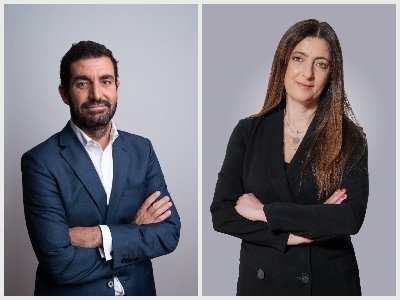Hard game

The Portuguese Online Gambling Legal Framework is recent. It was created in 2015, despite involving work that has been done since the beginning of the 21st century. In 2019, this law was revised and the major change is the Online Gambling Special Tax. This has been a thing that online operators have requested since day one. But it turns out it’s not going to benefit everybody
 Filipe Mayer (pictured, left), partner and responsible for the Online Gambling Area of CCA Advogados, and Tânia Ferreira de Almeida (pictured, right), Partner, and Coordinator of the Tax Department of CCA, explain what has changed, how online gambling tax has in the “Service of Regulation and Inspection of Games” (SRIJ) the best regulator in Portugal, and what the value of these taxes mean in the dynamics of the Portuguese online gaming market. Who wins this game, after all?
Filipe Mayer (pictured, left), partner and responsible for the Online Gambling Area of CCA Advogados, and Tânia Ferreira de Almeida (pictured, right), Partner, and Coordinator of the Tax Department of CCA, explain what has changed, how online gambling tax has in the “Service of Regulation and Inspection of Games” (SRIJ) the best regulator in Portugal, and what the value of these taxes mean in the dynamics of the Portuguese online gaming market. Who wins this game, after all?
Before understanding the tax regimes of online gambling, it’s important to understand what areas are being addressed. When we talk about online gambling law we are talking about regulating these types of gambling: sports betting, casino games (poker, in Portuguese law, is considered one of them), online horse betting and online bingo. What happened during the revision of the law was that the tax frame was changed in its three aspects. Gross revenue: this is the most common. Bets minus paid prizes. Which remains for the entity. Not here a lot of costs, maintenance, workers, etc… That is, before it was 15% to 30% on that gross revenue, now it’s set at 25%. Commissions: situations where players are playing against each other and not against the house you get a commission, for example, poker. Here, it was a 15% commission and it’s now set to 25%. A significant increase on a basis that is commission. Sports betting: it’s not about gross income, it’s about the total volume of bets. It was from 8% to 16%, and it’s down to 8%. This is where you feel the biggest reduction.
Filipe Mayer points out that these adjustments, especially in sports betting “are for the better”. However, there is another less talked about matter, which is very important and has to do with poker. “Because it is considered a casino game, poker had a fixed rate of 15% and increased to 25%. There is not much talk about poker because there are only two operators in Portugal as opposed to the other 15 that offer casino games, that is why it went a bit unnoticed in this change in the law,” he says. However, this is a significant increase. “A lot. The poker model could be seen as a much more favorable model than others because it was the only one where players play against each other, not against the house, which ends up getting just a commission of it. From 15% to 25% it is going to mean a bigger cut of that revenue.”
IS ONLINE GAMING SUPERVISION A SUCCESS?
For Filipe and Tânia Almeida, “incredible as it may seem, there is greater online control, exactly because there is a greater fear of the online population. But actually, the physical game’s community has adopted rules of online gaming at the level of security. In the past, controllers had to guess that a person was a potential risk or not, based only on appearances. In online gaming, it is mandatory to submit the ID card which is then validated in the central database of civil records. Automatically there’s a link with the SRIJ’s database and you can see in real-time if that person presents a risk. There’s nothing that makes us suspicious of legal online gambling because, in terms of regulation or compliance with procedures, they are very effective,” he says. Today, outside the casinos, there is a machine where the ID cards are checked in loco. Despite being a recent regulation, all operators who have opted to legally exercise online gaming activity in Portugal are subject to strict control. Tânia describes SRIJ as a unique case. “It is unique in Portugal, both for the regulatory and the fiscal part. It is the only case where there is a tax that is not administered by the tax and customs authority. It’s one of the simplest taxes there is because it takes all the information from the system, that is, there are daily communications (the monthly ones are the sum of these). It’s all automatic”. According to Filipe, “Portugal is one of the countries where it is most complicated to get a license because the process is very slow and the levels of control make all the difference. As the regulator collects the tax, he is much more concerned about the financial flow that the operators receive. This is unique in Portugal, I repeat. There must be few activities in the country where the regulator knows so well what to do”.
ILLEGAL GAME
With such an effective system of regulation, the apparent way to escape the law is through illegal gambling. There is no official data but Filipe says that “it will be close to 40%. These are optimistic numbers.” In illegal gambling, the operator does not have to pay tax, so he may have more competitive bets, but these have no guarantee. For example, he explains, “if I win, who can tell me I’ll get the money? You can’t report it because it’s illegal. There is no identity control, so minors can play. Only that people go after the offer of better prizes, that’s all”. Tânia says that “you have to be careful not to give in to the temptation to tax games with values that are not commercially viable because the biggest consequence of high taxes is the increased channeling of resources to illegal markets. The main reason for the government to regulate gambling is not to levy taxes, it must be to safeguard people’s safe gaming conditions”. However, this is also an opportunity for the government to increase its revenue. “This tax increase comes in this direction, that is, it is a relatively new market, the law comes from 2015, the first license was in 2016, so it is a market that in practice has three years. But it has grown in that time. In the number of operators, players, and betting volume. And therefore, by increasing the rate, while maintaining the base, the trend is a higher collection of tax revenue. When we think about the other taxes, which are already high, it is very tempting to raise taxes in what is called ‘addiction taxes’. It’s something that is less socially accepted, so it’s politically easy to sell a higher tax rate”, she says. However, this is already the limit of taxation. Filipe even says that “in online gambling concerning casinos, there’s been a general increase in taxation that’s beyond what would be a balanced market”.
DIVIDED EUROPE
Although each country has adopted its law and, in some countries, gambling remains illegal, Filipe “divides” Europe into two major movements. “If we divide Europe among the countries where gambling is allowed, we can talk about Northern Europe, with England, Denmark, Sweden, which are more open models, with more balanced taxation, that is, more competitive. In Southern Europe, Spain, France, and Italy are more closed regimes, in the sense that they don’t give operators the freedom to set their own rules”. Portugal ends up in the middle. To liberalize and create a law for online gambling took more than ten years of work, several governments, and finally in 2015, what was attempted since the beginning of the 21st century was achieved. Filipe says that although the law was a victory, “there was some over-regulation. We are one of the few countries that go to the point of making specific rules about the games, that is, how poker should be played, what are the variants of poker. It doesn’t give operators the freedom to offer the games they want. You can understand the fear of losing control, but the games exist and are constantly changing, with new variants”. What this causes is that there is already a set of games played in Europe in a certain way and not yet in Portugal because there is no regulation for that game and asking for it takes time and resources because it still has to go to the European Commission. There is no freedom in the offer because of excessive control by the regulator. “As the market matures, this situation may change. The rules may fall or the regulator may become quicker and more agile in adapting to new rules”, he says. Tânia guarantees that “the law is from 2015, we are all learning. Both the lawyers and the regulator itself. So it’s been a learning process and it’s good to keep the same people throughout these years, which has allowed us to evolve in the same direction and the path is promising”.
To read the article in full please download issue N.91 here












